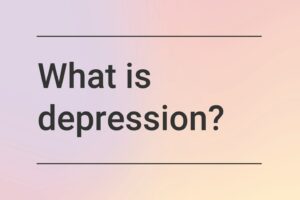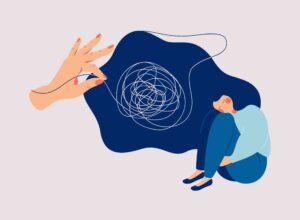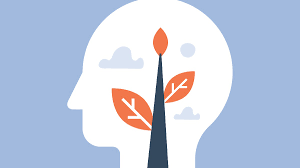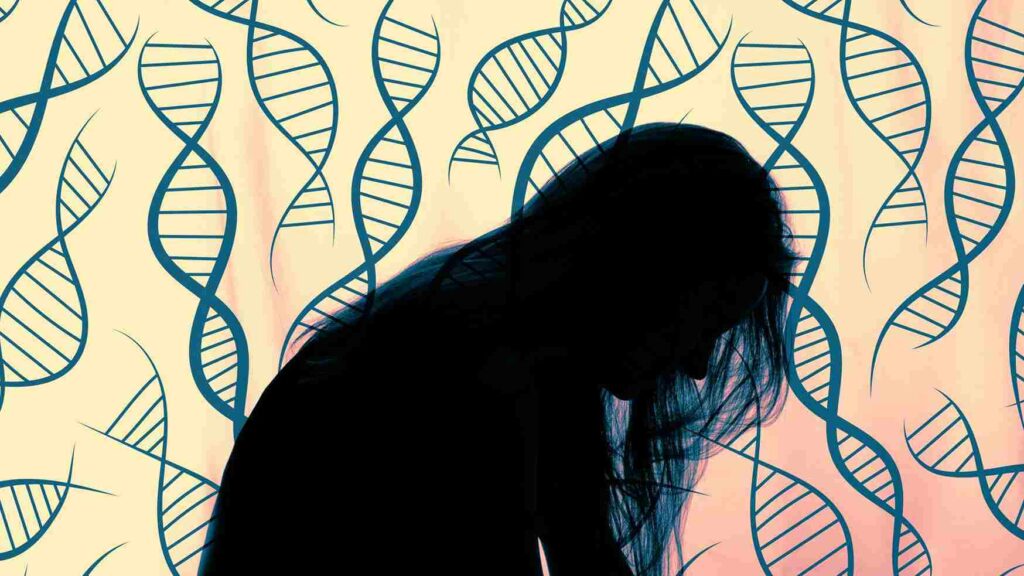Depression is a condition that affects many people around the world. While there are many different types of depression, one form that is often overlooked is genetic depression. Genetic depression refers to cases of depression that are caused by genes and cannot be cured with traditional methods like therapy or medication. If you think you may be suffering from genetic depression, it is important to identify and address the condition as soon as possible. In this blog post, we will discuss the symptoms of genetic depression and provide tips on how to get help.
Contents
What Is Depression?
 Depression is described as a mood disorder that causes a persistent feeling of sadness and loss of interest. It affects how you feel, think, and behave and can lead to a variety of emotional and physical problems. You may have trouble doing normal day-to-day activities, and sometimes you may feel as if life isn’t worth living.
Depression is described as a mood disorder that causes a persistent feeling of sadness and loss of interest. It affects how you feel, think, and behave and can lead to a variety of emotional and physical problems. You may have trouble doing normal day-to-day activities, and sometimes you may feel as if life isn’t worth living.
There are different types of depression, and it’s important to be aware of the different types so you can get the proper treatment. Major depressive disorder, or MDD, is the most common type of depression. MDD is characterized by a depressed mood that lasts for two weeks or more.
It has been studied that depression is linked to genetics and can be passed down from parents to children. And, research suggests that around 30 percent of people with depression have a family member who also has the condition. If you think you may be depressed, it’s important to see a doctor or mental health provider.
Can You Genetically Be Depressed?
There is always a great deal of debate surrounding the causes of depression. For a long time, it was thought to be caused by imbalances in certain chemicals in the brain. However, we now know that many different factors can contribute to the development of depression. One of these is genetics.
In many terms the answer is yes, you can be depressed due to genetics. A study that was conducted in 2003 showed that people with a certain gene were more likely to suffer from depression. This gene is known as the serotonin transporter gene. People who have this gene are thought to be more sensitive to changes in their environment and they are also more likely to ruminate on negative experiences.
Studies have also shown that people who have a family member who suffers from depression are more likely to develop the condition themselves. This could be due to genetics or it could be due to environmental factors, such as witnessing a loved one going through the condition.
The genetic factor in depression seems to be complex and many different genes are likely involved. This means that not everyone who has a family member with depression will develop the condition themselves. However, it does seem to be a significant contributing factor for many people.
If you think that you may be genetically predisposed to depression, there are certain things that you can do. The primary thing is to reach out to a professional to get a complete understanding of genetic depression.
How To Identify If Your Depression Is Genetic?
 It might be hard to identify whether your depression is genetic. After all, many things can trigger depression. However, some key signs may indicate that your depression is linked to your genes.
It might be hard to identify whether your depression is genetic. After all, many things can trigger depression. However, some key signs may indicate that your depression is linked to your genes.
For example, if you have a family member who suffers from depression, you may be more likely to develop the condition yourself. This is because it can be passed down through your family’s genes.
Other key signs that your depression may be genetic include if you’ve had multiple episodes of depression, or if your symptoms are particularly severe. Other key signs that your depression may be genetic include if you’ve had multiple episodes of depression, or if your symptoms are particularly severe. However, this may not always be the case. However, this may not always be the case.
There might be some common signs too, such as:
- Feeling hopeless, helpless, or worthless
- Losing interest in activities you used to enjoy
- Sleeping too much or too little
- Experiencing changes in your appetite
- Having difficulty concentrating
- Moving or speaking more slowly than usual
If you’re unsure whether your depression is genetic, it’s important to speak to a doctor or mental health professional. They will be able to assess your individual situation and provide you with the best course of treatment.
What Are Some Other Causes of Depression?
 As we have discussed genetic depression is one form of the condition, but there are other types as well. Depression can also be caused by:
As we have discussed genetic depression is one form of the condition, but there are other types as well. Depression can also be caused by:
- A chemical imbalance in the brain: This is the most commonly cited cause of depression and is what most people think of when they hear the word “depression.” This imbalance can be caused by several things, including certain medications, drug abuse, and even just the aging process.
- Chronic stress: If you are constantly under a lot of stress, it can eventually lead to depression. This is often seen in people who have high-pressure jobs or who are caretakers for others.
- Hormones: This is one of the most common causes of depression in women, as changes in hormone levels can lead to an imbalance that causes feelings of sadness and low energy. This is often seen during pregnancy, menopause, and PMS.
- Sleep disorders: There may be a link between sleep disorders and depression, as people who don’t get enough restful sleep are more likely to be depressed.
- Substance abuse: Sometimes people turn to drugs or alcohol to try and self-medicate their depression, but this can lead to more problems down the road.
- Grief or loss: This one is very similar to a traumatic event, but it can also be more long-term. If you are grieving the loss of a loved one, it’s normal to feel depressed for an extended period.
As you can see, there are many different causes of depression. It’s important to remember that if you are feeling depressed, you are not alone. Millions of people suffer from depression every day, and there is help available. If you think you may be depressed, the first step is to talk to your doctor. They can help you figure out if it’s depression or something else and can give you the tools you need to start feeling better.
How Does It Impact Life?
Depression is a serious mental illness that negatively impacts how you feel, the way you think, and how you act. It causes feelings of sadness, hopelessness, and/or irritability, and can lead to a variety of emotional and physical problems. For example, some negative consequences of genetic depression include:
- Difficulty concentrating: It happens because the depressed person often has a hard time focusing on anything, including work and school tasks.
- Anhedonia: This is the inability to experience pleasure from activities that used to be enjoyable, like sex, hobbies, or time with friends and family.
- Sleep problems: Depression can cause insomnia, which is difficulty falling asleep or staying asleep. It can also cause hypersomnia, which is excessive sleeping.
- Appetite changes: People with depression may lose their appetite or overeat.
- Fatigue: Depression can make a person feel tired all the time, even if they’ve gotten enough sleep.
- Physical aches and pains: This is one of the most common symptoms of depression, and can include headaches, backaches, and stomachaches.
- Suicidal thoughts: Depression can lead to suicidal thoughts or attempts. If you’re having these thoughts, it’s important to get help immediately from a mental health professional or suicide hotline.
If you’re experiencing any of these symptoms, it’s important to see a mental health professional for an evaluation. Depression is a treatable condition, but it’s important to get help early. Left untreated, depression can lead to serious consequences, so you should never hesitate to seek professional help.
Is Genetic Depression Curable?
 There is no one answer to this question as each case is unique. However, with the right treatment and support, many people with genetic depression can manage their condition and live fulfilling lives. One research has found that certain treatments can change the course of the disease.
There is no one answer to this question as each case is unique. However, with the right treatment and support, many people with genetic depression can manage their condition and live fulfilling lives. One research has found that certain treatments can change the course of the disease.
Typically the answer to genetic depression curability will depend on many factors. These include:
- Individual’s response to treatment
- The severity of the depression
- Presence of other medical or psychiatric conditions
- Family support
- Social support
There is some evidence that shows that people with genetic depression can get better with treatment and live full lives. However, each case is unique, so it’s important to work with a mental health professional to figure out what treatment plan is right for you.
But if you are struggling do not avoid or replace professional help with self-help. If you are feeling like you need to harm yourself or someone else, please get professional help immediately.
How Can You Treat It?
If recovery is possible surely treatment is worth seeking out. There are a few ways to treat genetic depression and they are:
Cognitive behavioral therapy
CBT is a form of therapy that is used to help patients recognize and change negative thinking and behavior patterns. For example, a therapist may help a patient reframe the way they think about their depression. They help patients see that their depression is not who they are, rather it is something that is happening to them.
Interpersonal therapy
IPT is a type of therapy that focuses on improving communication and relationships. It works to help patients understand how their relationships affect their moods. It also helps patients learn how to express themselves more effectively. The main aim of IPT therapy is to help patients develop healthier relationships.
Medication
There are many different types of medication available to treat depression. Some commonly prescribed medications include:
- SSRIs
- SNRIs
- MAOIs
- Tricyclics
Medication can be very effective in treating depression, however, it is important to work with a doctor to find the right medication and dosage. It is also important to be aware of the potential side effects of any medications.
Support groups
Support groups are considered an important part of treatment for depression. Joining a group can provide you with social and emotional support, as well as practical advice on how to cope with your condition.
There are many different types of support groups available, so it’s important to find one that’s right for you. Make sure to do your research and ask around before making a decision. There are also online support groups available if attending meetings in person is not an option for you.
Self-help
 There are several things you can do to help manage genetic depression.
There are several things you can do to help manage genetic depression.
- First, educate yourself about the condition. The more you know about genetic depression, the better equipped you will be to deal with it. There are many excellent books and articles available on the subject.
- Second, make sure to take care of yourself physically. Eat a healthy diet, get plenty of exercise, and get enough sleep. These things will help to keep your mind and body in good shape and make it easier to cope with the condition.
- Third, find a relaxation technique that works for you and practice it regularly. This can help to reduce the stress and anxiety that are often associated with genetic depression.
- Fourth, connect with others who have the condition. There are many online and offline support groups available. Connecting with others who understand what you are going through can be a great source of support and understanding.
- Finally, seek professional help if you feel that you need it. A therapist or counselor can help you to understand and manage the condition. If you are on medication for depression, make sure to follow your doctor’s instructions carefully.
By following these tips, you can help to manage genetic depression and live a full and happy life. You should always be calm and positive because it will help you a lot. Also, don’t get too stressed out and if you feel like you need to talk to someone, there are plenty of people who want to help. You’re never alone when dealing with this condition.
Conclusion
Conclusively genetic depression is a real and serious condition that can be addressed with the help of mental health professionals. There are also some other causes but when depression is caused by genes it is important to seek help. If you are struggling with depression, please reach out for help. No one has to suffer from this condition alone.
All in all, these are some things that everyone should keep in mind regarding genetic depression. And remember that help is always available. You can also contact Therapy Mantra for affordable online counseling services.
We have a team of professional therapists who can provide you with the support and guidance you need to recover from this condition. Contact us today to learn more about our services. You can also book an online therapy session or download our free Android or iOS app.


